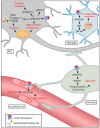Insulin Signaling as a Therapeutic Target in Glaucomatous Neurodegeneration
- PMID: 33925119
- PMCID: PMC8124776
- DOI: 10.3390/ijms22094672
Insulin Signaling as a Therapeutic Target in Glaucomatous Neurodegeneration
Abstract
Glaucoma is a multifactorial disease that is conventionally managed with treatments to lower intraocular pressure (IOP). Despite these efforts, many patients continue to lose their vision. The degeneration of retinal ganglion cells (RGCs) and their axons in the optic tract that characterizes glaucoma is similar to neurodegeneration in other age-related disorders of the central nervous system (CNS). Identifying the different molecular signaling pathways that contribute to early neuronal dysfunction can be utilized for neuroprotective strategies that prevent degeneration. The discovery of insulin and its receptor in the CNS and retina led to exploration of the role of insulin signaling in the CNS. Historically, insulin was considered a peripherally secreted hormone that regulated glucose homeostasis, with no obvious roles in the CNS. However, a growing number of pre-clinical and clinical studies have demonstrated the potential of modulating insulin signaling in the treatment of neurodegenerative diseases. This review will highlight the role that insulin signaling plays in RGC neurodegeneration. We will focus on how this pathway can be therapeutically targeted to promote RGC axon survival and preserve vision.
Keywords: CNS; PI3K/Akt; RGC; glaucoma; insulin; neurodegeneration; neuroprotection.
Conflict of interest statement
The authors declare no conflict of interest.
Figures

References
Publication types
MeSH terms
Substances
Grants and funding
LinkOut - more resources
Full Text Sources
Other Literature Sources
Medical

